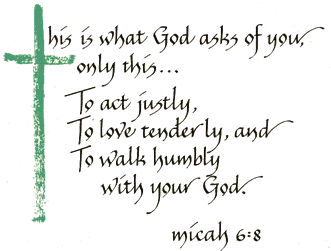catholicPittsburgh.org is the place for information, news, commentary, reflections and community building among the people of God who are renewing the Catholic Church in Western Pennsylvania.
More about us
Welcome ...
Partnering Groups
The following organizations are partners with catholicPittsburgh.org:
A Question of Love
Reflection on the Thirtieth Sunday in Ordinary Time (October 23)
by Greg Swiderski
The readings for this Sunday:
- Exodus 22:20-26
- I Thessalonians 1:5c-10
- Matthew 22:34-40
The full text of the readings can be found here.
There are times when I want to ask for a refund from my past education; there were definite shortcomings. Why (I suspect I am not alone.) were we taught to examine our consciences and feel guilty about such idiosyncratic Roman Catholic practices like fasting from meat on Fridays? Why didn't "they" get the central picture? Why not invite us to explore our inner feelings about the most defining of all virtues, love?
Several years ago I walked for about an hour with a heart surgeon. He asked me why I occasionally refer to God as lover. I explained that this theological virtue defines the heartbeat of the universe: the Sacred Heart, for God's sake. Paul announces charity as the quintessential gift and John tells us that God is love. Of course, we have in this Sunday's gospel, the highest commandment is Love. God is a verb, not a noun. God is a lover, clear, simple. Why else would the Hebrew writers so often use the metaphor of the bride and bridegroom to describe the relationship of their God with their community? Why is the word "God" missing in the erotic love poetry of the Song of Songs? Because no one needs to announce the name in the midst of such ravenous, sensuous love. Case closed.
Well, it actually isn't; for as Francis is supposed to have said (in Italian): Preach; when necessary, use words. (On this World Mission Sunday, we might remember this admonition.) Imagine examining my conscience to see how I have lived out of love? Sounds demanding and mature; much more so than asking myself if I stepped into a Protestant Church or had "a dirty thought."
The second part of this commandment seems most intriguing, especially for caregivers like nurses and parents. "Love...as you love yourself." So many equated self love with pride or other distortions. Did anyone ever suggest that I explore my own self respect and dignity? I might ask myself if I get sufficient exercise or if I am developing my abilities and talents; do I like myself, body, heart, mind, and soul?
Exodus reminds us that this must work in the real world. Abstract ideas and flowery, pious platitudes seem insufficient. Peoples throughout the world seem generous and compassionate as we see when a tsunami strikes, or an earthquake or hurricane. People of any or no religion share the virtue of compassion.
However, we also inherit the voices of the prophets who spoke to their nation. There are far more verses in the Great Book about the powerless nobodies and caring for the least among us, than there are quotes about other personal issues which our Roman tradition has so often force fed us. They know how to play into guilt about anger and sex.
- By JoanHouk at Oct 22 2005 - 6:53pm
- Reflections
Micah 6:8

©1996 Cards by Anne
Used with permission